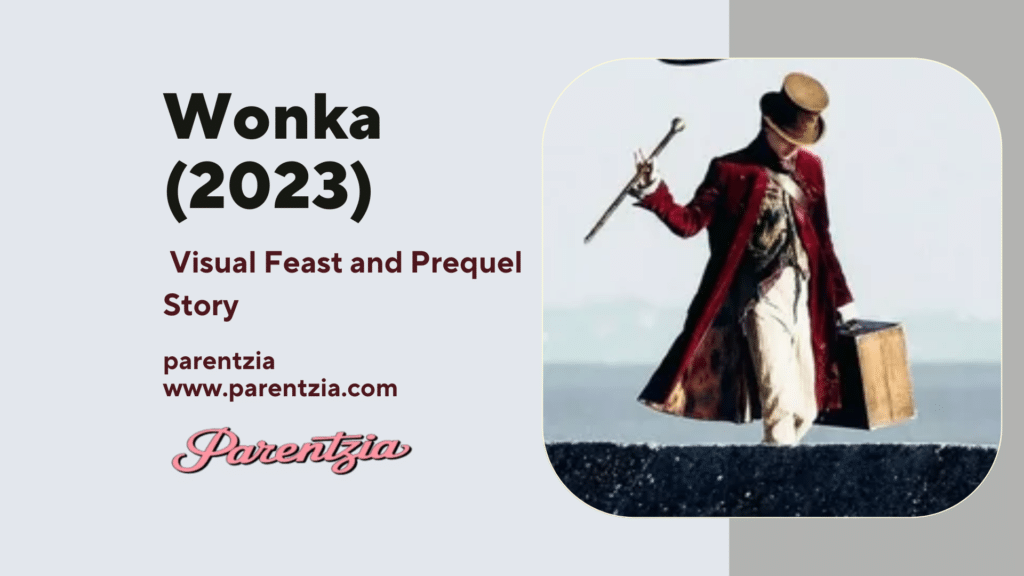The magic of Willy Wonka has enchanted audiences for generations. Whether it’s through the lens of Gene Wilder’s whimsical portrayal in the 1971 classic, or Johnny Depp’s eccentric take in Tim Burton’s Charlie and the Chocolate Factory, Willy Wonka remains an iconic figure in both literature and cinema. The latest addition to this beloved world, Wonka (2023), offers a fresh look at the legendary chocolatier’s origins in a Prequel Story that is both a Visual Feast and an emotionally resonant journey. But does it capture the same magic that has captivated viewers for decades? This in-depth Wonka Movie Review will examine the film from multiple angles—plot, performances, visuals, and more—to assess its value for fans and newcomers alike.
The Magic Behind the Story: Plot Overview
The Wonka (2023) film, produced by Warner Bros, takes audiences back in time to explore the life of a young Willy Wonka, played by the talented Timothée Chalamet. This origin narrative unfolds long before the events of Charlie and the Chocolate Factory, diving into the history of how Wonka’s extraordinary imagination and unyielding ambition shaped his future as the world’s most famous chocolatier.
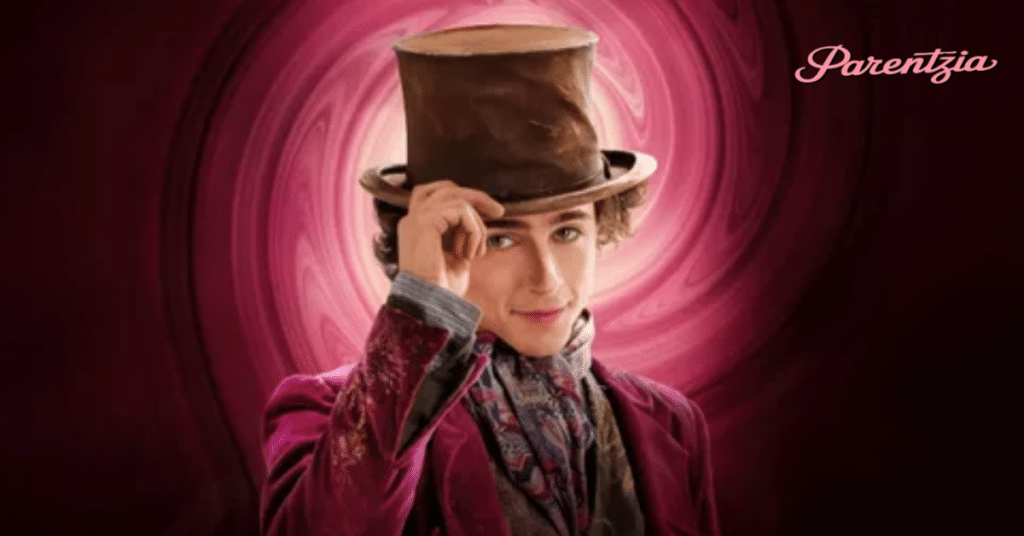
The movie traces Willy’s early years as he dreams of opening a fantastical chocolate factory. Raised in a small town and inspired by fantastical concepts, Wonka embarks on a journey filled with challenges, friendships, and quirky characters that all play a role in his transformation into the man we know today. Along the way, musical numbers and whimsical motifs fill the screen, blending humor, heart, and fantasy to craft a world that feels both nostalgic and new.
You might also like “Arthur the King Movie Review: A Journey of Survival and Loyalty”
Key Themes
The film touches on several key themes that resonate with a broad audience, making it safe for kids but engaging enough for adults to enjoy:
- Creativity and Ambition: Wonka’s journey is one of self-discovery, exploring the limitless potential of his imagination.
- Friendship and Loyalty: As Wonka builds his chocolate empire, relationships play a crucial role in his development.
- Perseverance Against Odds: The challenges Wonka faces highlight themes of resilience and optimism, offering valuable lessons for children and adults alike.
The fantasy themes in the movie are visually arresting but also emotionally grounded, making it accessible for a family audience.
Performance Analysis: Timothée Chalamet and Supporting Cast
One of the film’s most anticipated elements was Timothée Chalamet taking on the titular role of Willy Wonka. Known for his nuanced performances in films like Dune and Call Me By Your Name, Chalamet brings a fresh take to the Roald Dahl character, blending the quirky charm of the chocolate maker with a touch of vulnerability.
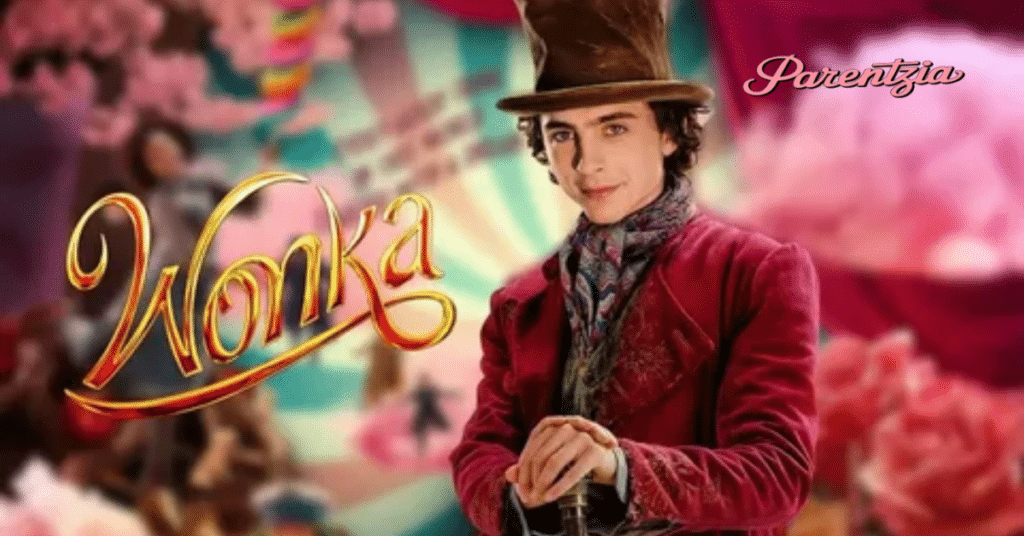
Timothée Chalamet as Willy Wonka
Chalamet’s portrayal captures Wonka’s whimsical nature while adding layers of complexity that weren’t fully explored in previous adaptations. His version of Wonka is more than just eccentric; he’s a dreamer with a sense of innocence that makes his journey deeply relatable. Chalamet perfectly balances the childlike wonder that defines Wonka while giving the character emotional depth, particularly in moments of struggle and self-doubt.
Compared to past iterations, such as Gene Wilder’s role in the original 1971 film or Johnny Depp’s more eccentric take in 2005, Chalamet’s Wonka feels grounded. He embodies a character who hasn’t yet built his chocolate empire but has the seeds of brilliance blooming within him. This film critique shows that Chalamet’s performance is both refreshing and faithful to the Roald Dahl book’s spirit, making it one of the standout aspects of the film.
Supporting Cast Highlights
In addition to Chalamet, the film features a strong supporting cast that adds both depth and humor to the narrative. Some key performances include:
- Hugh Grant as an Oompa-Loompa: Grant’s quirky portrayal brings humor and eccentricity to the classic character, offering a nod to the musical sequences we’ve come to expect in Charlie and the Chocolate Factory.
- Keegan-Michael Key and Olivia Colman: Both actors shine in their roles, delivering witty dialogue and comedic moments that lighten the film’s more emotional scenes.
Character Development
Unlike other films where supporting characters are used mainly for comic relief, Wonka (2023) takes the time to develop these characters meaningfully. Each of them plays a crucial role in shaping Wonka’s path, adding layers to the story that make it feel richer and more grounded. The relationships that form between the characters contribute to the movie’s emotional depth, making the film more than just a series of magical set pieces.
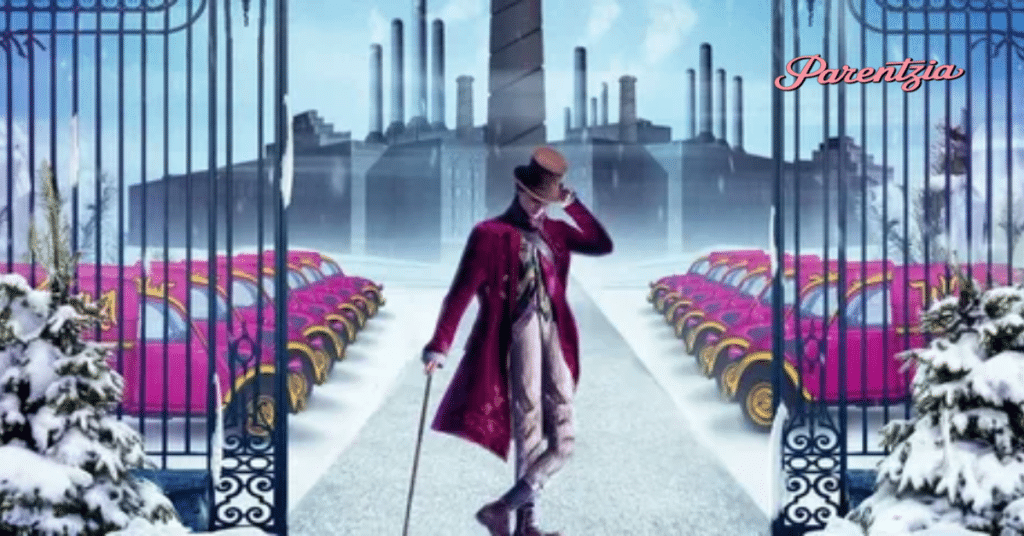
Direction and Screenwriting: Paul King’s Vision
Paul King, the director best known for his work on the Paddington films, brings his signature whimsical style to Wonka. His previous success with Paddington—a series that beautifully blends charm, humor, and heart—set high expectations for Wonka. And he largely delivers. King’s direction maintains a fairy-tale quality throughout the film, but it never feels overly saccharine or unrealistic.
Balancing Whimsy with Depth
What sets Wonka apart from other family films is King’s ability to balance the fantastical concepts with moments of real emotional depth. He doesn’t shy away from exploring Wonka’s vulnerabilities, making the character more relatable while keeping the film child-friendly. King’s direction ensures that the film is suitable for children but also layered enough for adults to find it equally engaging.
Screenplay and Dialogue
The screenplay, written by Simon Farnaby and Paul King, does a stellar job of blending musical numbers with witty dialogue. The film’s humor, while light-hearted, never feels forced. Instead, it’s woven into the narrative, enhancing the whimsical tone without sacrificing emotional moments. For instance, the song performances feel natural within the story, with each one adding to the plot rather than distracting from it.
Visuals and Cinematography: A True Visual Feast
One of the most striking aspects of Wonka is its visual design. The film is nothing short of a visual spectacle, with each scene crafted to evoke wonder and delight. Cinematographer Seamus McGarvey plays a significant role in creating this enchanting world, using vibrant colors, whimsical sets, and imaginative visual elements that make each frame feel alive.
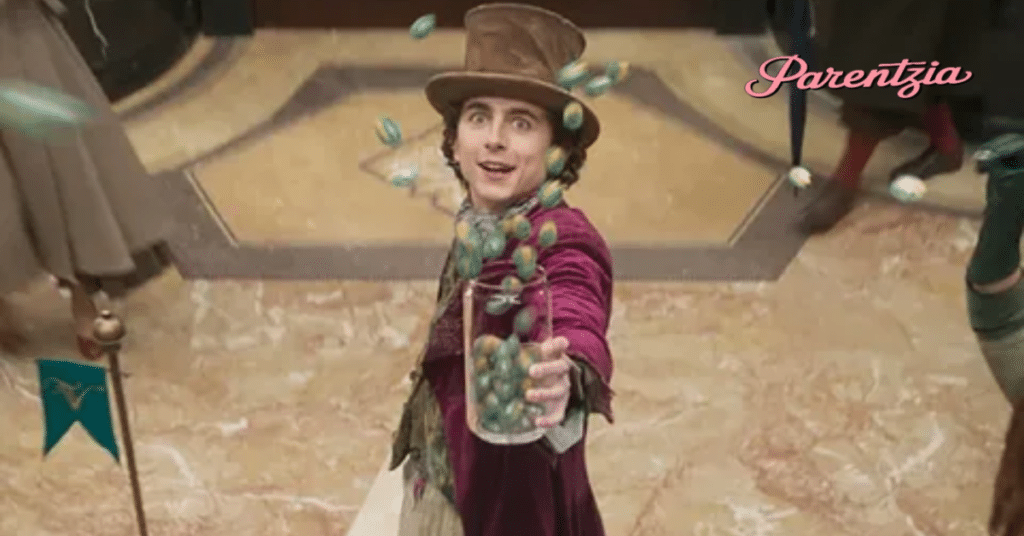
Production and Set Design
The production design of Wonka immerses viewers in a visually rich world. From the moment you enter Wonka’s early chocolate experiments to the final, more polished scenes in his factory, the design team spares no detail. The sets are a beautiful blend of reality and fantasy, mirroring the fantastical themes present in Dahl’s original work.
Here’s a table that breaks down the key visual elements in the movie:
| Visual Aspect | Description |
| Color Palette | Rich, vibrant colors dominate the screen, from pastel tones to bright, saturated hues. |
| Set Design | Fantastical chocolate-making contraptions, whimsical environments reminiscent of Roald Dahl’s world. |
| Costume Design | Timothée Chalamet’s iconic Wonka outfit blends vintage charm with a modern twist. |
| Cinematography Techniques | A mix of wide, sweeping shots to showcase the magical world, and tight close-ups for emotional moments. |
Costume Design and Detail
Another visually captivating element of the film is its costume design, particularly Wonka’s own wardrobe. Chalamet’s Wonka is adorned in vintage, yet timeless, pieces that are both eye-catching and filled with subtle nods to Roald Dahl’s character. His iconic purple coat and top hat are reimagined with contemporary flair, while staying true to the Wonka of literary and cinematic history.
Music and Soundtrack: Musical Numbers and Emotional Scoring
The soundtrack of Wonka is another highlight, thanks to composer Neil Hannon. The music in the film strikes a balance between playful and emotional, adding layers to the story while keeping the whimsical tone alive.
Musical Numbers
Unlike previous adaptations, where musical sequences were central to the plot (remember the famous “Pure Imagination”?), Wonka (2023) integrates its songs more naturally into the story. The musical performances are memorable, yet they never feel like they are interrupting the narrative. Each song fits seamlessly into the progression of the plot, offering insight into the characters’ emotions while entertaining the audience.
Pacing and Editing: A Smooth Journey
For a film that juggles humor, emotional beats, and fantasy, Wonka maintains a well-balanced pace. The movie moves quickly enough to keep younger viewers engaged, while taking its time with character development and world-building to ensure that every plot point lands.
Editing Flow
The editing, handled by Mark Everson, ensures smooth transitions between the movie’s musical sequences, dramatic moments, and light-hearted scenes. The blend of these elements keeps the movie flowing without feeling disjointed or rushed. This cohesive editing style enhances the audience’s experience, maintaining their engagement from start to finish.
Is Wonka Safe for Kids?
A major concern for parents considering Wonka is whether the film is safe for kids. The movie carries a PG Age Rating, meaning it’s suitable for children, though parental guidance is recommended for younger viewers.
Parents Guide: What to Expect
- Fantasy Elements: The movie is filled with magic elements, but nothing too frightening or dark for young audiences.
- Mild Humor: The humor is light and playful, making it family-safe.
- Emotional Themes: There are moments of sadness or emotional intensity, but they are handled with care, ensuring that the film remains child-friendly.
Parents can feel confident that Wonka provides a wholesome, entertaining experience for families, much like its predecessors.
Final Thoughts and Conclusion
Overall, Wonka (2023) is a delightful addition to the world of Willy Wonka. Timothée Chalamet delivers a heartfelt performance that captures the essence of Dahl’s beloved character while bringing something new to the table. The visual spectacle, combined with musical numbers and a rich narrative, makes the film a standout in today’s landscape of family cinema.
Whether you’re a longtime fan of the Roald Dahl book or a newcomer to the world of Charlie and the Chocolate Factory, Wonka has something for everyone. It’s a film filled with heart, imagination, and a sense of wonder that will leave both kids and adults smiling.
In conclusion, Wonka manages to offer a fresh take on an iconic figure while respecting the magic that made him unforgettable in the first place. This prequel story stands on its own while nodding to its rich heritage, making it a must-watch for families and fans alike.

Tina Grey is an experienced blogger with a passion for uncovering the best in film. With years of writing and a keen eye for detail, Tina brings insightful reviews and engaging content to Parentzia. Her deep love for movies, combined with her expertise, helps readers discover must-watch films across genres. When she’s not reviewing, Tina enjoys exploring new cinematic trends and sharing her love of film with her audience.

